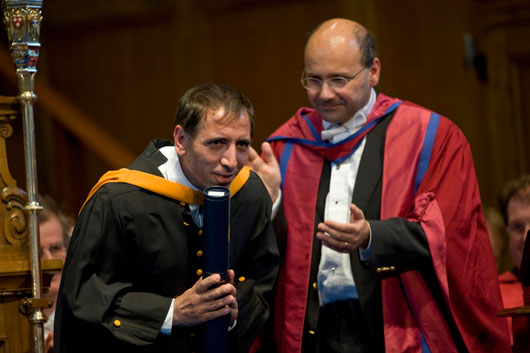Laureation address – Mohsen Makhmalbaf

Mohsen Makhmalbaf
Honorary Degree of Doctor of Letters
Laureation by Professor Ali Ansari
School of History
Wednesday 23 June 2010
Vice-Chancellor, it is my privilege to present Mohsen Makhmalbaf for the Degree of Doctor of Letters, honoris causa.
Mohsen Makhmalbaf has been at the forefront of the new wave in Iranian cinema which has captured the world’s imagination in the past two decades.
His contribution to the arts has and continues to be impressive. In a career spanning nearly three decades he has written and directed eighteen films, another seven short films and has written screenplays for an additional twelve works. In 1994 two of his films, ‘Time of Love’ and his groundbreaking ‘Salaam Cinema’ were included in the official section of the Cannes Films Festival and in the following year – 1995 – he returned to Cannes with ‘Gabbeh’. His films quickly achieved international recognition and he was soon in receipt of a number of prestigious awards and honours. Indeed ‘a number’ may be an under-statement! He has in fact been awarded over thirty prominent honours and prizes including the Special Prize from Boston University (2000), the Legion d’honneur from France (2002) and the winner of the ‘Best Asian Film maker’ award from the Pusan International Film festival. He became the Dean of the Asian Film Academy in 2007.
His cinematic achievements have become so iconic in Iran that Mohsen himself became the subject a film by fellow film-maker Abbas Kiarostami. ‘Close-up’ which was made in 1990 (and was one of the first Iranian films I saw) was wonderfully representative of that blend of fact and fiction which has come to characterise contemporary Iranian cinema. It is about a man who was so captivated by the process of film-making that he decided to impersonate his hero, Mohsen Makhmalbaf, in a bid to persuade Iranians to star in a new film he is making. The film captures perfectly the fascination of Iranians with films and their willingness to believe. The most poignant moment comes at the end of the film when Mohsen himself makes a cameo appearance and confronts – gently – his impersonator, who immediately breaks down in tears when faced with reality of the fiction he has perpetrated.
However, perhaps Mohsen Makhmalbaf’s his greatest achievement has been to successfully combine his artistic brilliance with a social awareness and conscience. His work has always sought to bring to light the realities and contradictions of the world around us, and not only in his native Iran. His highly influential film, ‘Kandahar’ – which premiered at the Cannes Film Festival in the summer of 2001, drew attention to the problems of Afghanistan under Taleban rule well before the terrible events on 9/11. It earned him the Frederic Fellini Prize from UNESCO. His work in Afghanistan led him to pursue his humanitarian interests and he gave up film making for two years in order to fight for the rights of Afghan refugees in Iran to have the legal right to have their children educated within the Iranian educational system. Moreover in the aftermath of 9/11 and the fall of the Taleban, Mohsen took responsibility for eighty two projects in both Iran and Afghanistan including the building of schools, cinematic training and a variety of health projects.
Indeed latterly, Mohsen has focussed more on a supportive role, with his film making taking a backseat to his social and welfare projects. But he has also found time to encourage his family to pursue their own highly successful careers in film making, including two of his daughters, Samira and Hana, and his wife Marziyeh.
Vice-Chancellor, in recognition of his major contribution to Iranian film-making, I invite you to confer on Mohsen Makhmalbaf the Degree of Doctor of Letters, honoris causa.
Category Awards